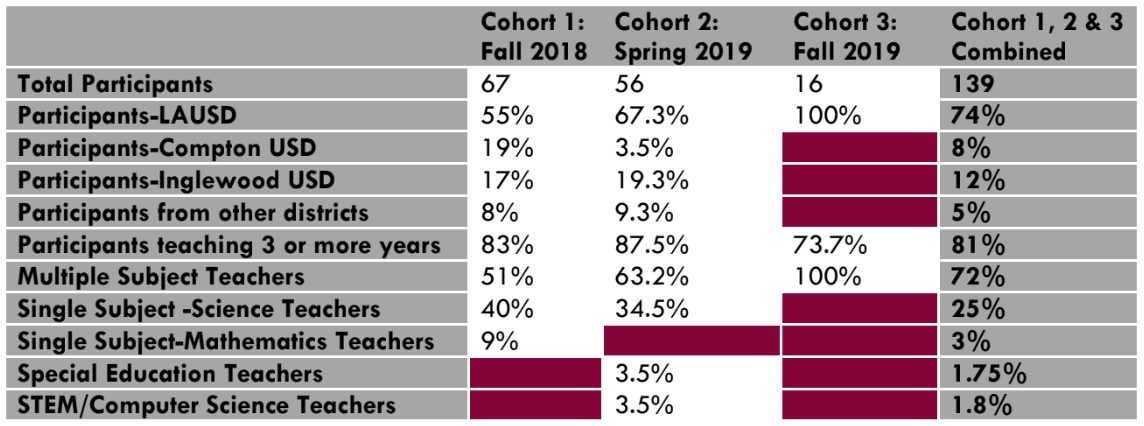LA2050 Blog
We’ve got access to the information that every Angeleno needs to make an impact. Our blog features the latest LA2050 news, announcements, features, happenings, grantee updates, and more.

CISE Empowers Teachers to Empower Students for the Future of STEM
PostedThis is an update on the winning proposal from the PLAY category in the 2018 LA2050 challenge.
California State University Dominguez Hills-LA2050 Project: NGSS & Fab Tech Training
Report on activities between January 2019 and December 2019
As part of the LA2050 Activation Challenge, the Center for Innovation in STEM Education (CISE) at CSU Dominguez Hills proposed to empower teachers and provide dynamic training and mentoring on the state adopted, industry-recognized Next Generation Science Standards. We proposed training two cohorts of 50 teachers (100 total) over two years, however, we have been able to sustain the project and are currently training the third cohort of teachers.
We are pleased to report that the third cohort of 16 teachers is due to complete the training on January 9, 2020, thus exceeding our target number of teachers per cohort and 100 teachers overall. Following is a snapshot of the teachers served, based on participants that completed a post-training survey:
74% of participants were teachers from LAUSD.
8% of participants were teachers from Compton USD.
12% of participants were teachers from Inglewood USD.
5% of participants were teachers from Lynwood USD.
87.5% of participants indicated that they had been teaching for three or more years.
70% of the participants taught multiple subjects.
25% of the participants taught science.
1.75% of the participants taught Special Education classes.
1.8% of participants taught STEM/Computer Science.

The CISE team has met all project goals through the grant implementation and is continuing to train a third cohort of teachers, offering them the opportunity to become NGSS experts and obtain a certification in Fabrication Technology. The team recruited teachers, held Kick-Off events, completed the first and second cohort of NGSS Super Training, and conducted classroom observations and Lesson Study Cycles. One of the primary focuses of the training was establishing the foundation for the Next Generation Science Standards. Participants continue to learn about the organization of NGSS, identifying what Performance Expectations (PE), Disciplinary Core Ideas (DCIs), Science and Engineering Practices (SEPs), and Cross-Cutting Concepts (CCCS) are, and how they compare to the previous set of standards. The training empowers teachers to explore how teaching with an emphasis on DCIs, SEPs, and CCCs, referred to as 3-Dimensional learning, better prepares students for college and career readiness.
All NGSS Super Training participants are offered the opportunity to obtain the Beginner Level Certification in Fabrication Technology which certifies teachers as basic, proficient, and advanced in the use of fabrication laboratory equipment for curriculum design and delivery. Every participant in cohorts one and two was successful at meeting the requirements for the Beginner Fabrication Technology Certification. Participants in cohort three will complete their certification on January 9, 2020.
Prior to the classroom observation, teachers met with an NGSS expert to agree on the observation focus and review the lesson plan; the NGSS expert reviewed and documented evidence of good teaching practices and provides formal feedback. During the Lesson Study Cycles, teams of teacher trainees engaged in collaborative planning-teaching-observation of learning, followed by lesson evaluation and refinement in preparation for a second cycle of classroom observations.
Based on the data collected throughout the training, participants found the training to be a valuable experience. Each teacher had an opportunity to demonstrate mastery and an ability to integrate the Next Generation Science Standards and the Fabrication Technology into a unit of instruction which was submitted into a shared google drive folder, for free accessibility. We are excited to report:
● Perfect attendance for each day of the training: 100% of participants attended every session.
● 100% of participants were very satisfied or satisfied with all the workshop sessions.
● 100% of cohort one and two participants indicated that they would recommend this training series to other teachers.
● 88% of cohort one and two participants indicated that they would be interested in receiving an additional certification if provided the opportunity.
Survey data indicates an overwhelming positive response to the NGSS Training offered this year.
Below are some sample participant comments:
● Great idea to look at the aquarium webcam through the lens of different CCC. It really pushed me to think beyond what I normally consider.
● Wonderful presenters! They were well prepared and very helpful!
● I look forward to using the lesson study model to further my practice.
● The instructors are very knowledgeable and passionate about making science accessible to children in underserved communities.
● I finally have a better understanding of NGSS and the 3 dimensions.
Overall, program completers acquired the required knowledge about NGSS, thus contributing to the national effort as well as our local effort to implement the new standards one school at a time. Over 20 teachers expressed an interest in participating in Cohort 3 and 16 were selected and are in the process of completing the entire training, thus exceeding the target number by 28 teachers.
While we are still a few years away from being able to measure and evaluate the impact on college and community college completion and matriculation rates, we feel confident about the impact our program has had on increasing students' immersion in Science, Technology, Engineering, and Math content. In context, 83 of the elementary teachers who completed our program teach about 30 students each year and the 56 middle/high school teachers teach about 150 students each year, hence impacting over 10,890 students in one year who will benefit from their teachers' new knowledge and enthusiasm. Over five years, these 139 teachers will reach 54,450 students! That means 54,450 more students excited and inspired about STEM and fabrication technology.
That's 54,450 more individuals who will contribute to making Los Angeles not just a better place, but the best place to learn, create, play, connect, and live by the year 2050!